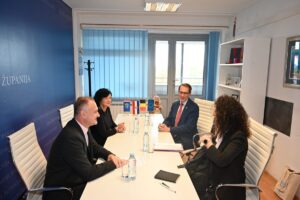Belgium, one of the 6 founding countries of the EU, presides over the Council of the European Union in the first six months of this year. These are indeed challenging times and the Belgian presidency will have to continue dealing with the consequences of the war in Ukraine, the conflict in the Middle East, extreme climate events, the energy crisis, disinformation, a serious migration pressure, uncertainty about the future political path of our big Transatlantic ally, and much more, for Diplomacy&Commerce says H.E William De Baets Ambassador of the Kingdom of Belgium to Croatia.

- Belgium, one of the 6 founding countries of the EU, presides over the Council of the European Union. The priorities of that presidency are the protection of citizens, the strengthening of the economy and preparations for a common future. How official Brussels plans to implement that in practice?
Belgium is indeed one of the founding members of the EU and that explains why it is already the 13th time that Belgium has the rotating Presidency of the Council of the European Union. As Belgium is taking on the presidency in challenging times, the experience we have acquired in the past will be of great use.. The motto of the Belgian presidency is indeed ‘Protect. Strengthen. Prepare.’ and is translated into six thematic focus areas for our work. These are:
- Defending rule of law, democracy, and unity. While protecting the individual freedoms and EU’s citizens’ well-being, respect for rule of law and democracy will make the EU stronger. Uniting and enlarging the EU should also make our continent stronger. The Belgian presidency is therefore committed to support candidate countries in their efforts to join the EU while helping to prepare the UE for future accessions.
- Strengthening our competitiveness. We must aim at ensuring a level playing field for our businesses, enabling them to compete fairly both within Europe and on the global stage. The EU should also become stronger on the global stage, thanks to well defined long-term competitiveness and industrial policies.
- Pursuing a green and just transition. The energy and climate transition will be at the heart of our priorities for carrying on EU’s ambitious agenda, driven by the urgent need to address the triple crisis of climate change, biodiversity loss, and pollution.
- Reinforcing our social and health agenda. The Belgian presidency will also seek to strengthen social dialogue at all levels, promote fair labor mobility, mental health at work as well as access to sustainable social protection and to decent and affordable housing for all.
- Protecting people and borders. The Migration Pact agreed upon during last December provides the framework for the presidency to work on strengthening the external dimension of migration and asylum, especially with our African partners.
- Promoting a global Europe. In pursuing to achieve its foreign policy goals, with respect for the multilateral and the rules-based international system as a basis, the EU must fully mobilize its economic, security and defense capabilities, as well as its development and humanitarian assistance capacity.
Of course, the Belgian presidency will also provide particular attention to maintaining our unwavering support to Ukraine in its fight for its very existence. This is quite an ambitious program but these priorities are based on the program and common agenda for the 18 months of the Trio made up by Spain, Belgium and Hungary. We continue the excellent work of the Spanish presidency and prepare to hand over to the Hungarian presidency by the end of June. On top of this heavy, more traditional program, our presidency also has a Public Participation program. It will work with Citizen panels composed by randomly selected Belgian residents who will come together during 3 week-ends to discuss on the topic of artificial intelligence and its impact on the future of European society. The presidency will also work with the Royal Egmont Institute for International Relations, an independent think tank based in Brussels, on developing a Belgian Expert view on the post-2024 EU.
- Belgium will have only four months available for negotiations on behalf of the EU Council this time because the last plenary session of the European Parliament in this convocation will be held in April. How this will affect your plans and the speed of realization of the set goals specifically when we are talking about deadlines and on the legislative level?
It is a particular presidency as there are European elections in June and the European Parliament therefore will hold its last plenary session in April. Thereafter no legislation will be passed anymore until the next institutional cycle starts. It gives us indeed a very tight timetable -in reality, only three months- for negotiating deals and closing the legislative process, with some 60 pieces of legislation we would like to finish. There is a common willingness though to pass as much as possible legislation and to that end the European Parliament is also adding more voting sessions. But bilateral negotiations and trilogues are currently moving at a hellish pace. It must be terrible for my colleagues in Brussels but I think they must also be very satisfied when I see how many agreements are being reached. Once the legislative work is finished, the Belgian presidency will be able to focus on the Strategic Agenda 2024-2029. It will support the adoption of the Strategic Agenda, prepare discussions on the future of the European Union, and of course work towards a seamless transition to the next presidency.I seize this opportunity to share some figures and give an idea of the activities during our presidency. More than 530 informal and around 2.000 formal meetings take place in these six months. These include preparatory meetings and informal meetings of national representatives in Council working groups as well as meetings at the level of Ministers and Heads of State or Government. For Ministers and Heads of State or Government alone, nearly 150 formal and informal meetings will be organized, in Brussels but also in other cities in Belgium.
- Elections for the European Parliament will be held from June 6th to 9th , and Belgian citizens will have national parliamentary elections at the same time. This year is an election year in more than 40 countries in the world, in the United States, Russia, India, Indonesia, Mexico, which is almost half of the world’s population. In your opinion, in what direction is Europe going and can we have an idea of what the European Parliament and the EU itself will look like after the elections?
It is very difficult to predict the outcome of the elections, nor in Belgium neither in the EU. Over the last years, we have however been witnessing a polarization of our societies and a growing success for political parties and persons who contribute to this polarization. For some voters, voting for divisive parties or candidates is a way to express their dissatisfaction and concerns. There is no reason to think that this tendency will be altered, rather on the contrary. Analysts seem to predict that in many countries we will see a major shift to the right, including populist radical right parties, while center left and green parties would lose votes and seats. According to their views, these elections might jeopardize the stability that the European Parliament had thanks to coalitions of mainstream centrist groups. Also -and that’s somehow paradoxical- the number of Anti-European Members might increase in the European Parliament. If these predictions become true, these shifts might have consequences for future EU legislation in different policy areas, in particular regarding environment and green transition, and migration and asylum. At the national level, polarization and voting for more radical parties break traditional schemes and make building a coalition and forming a government more difficult. As you know, Belgium had previous experiences in difficult and protracted government negotiations, and this might be repeated again. But be assured, Belgium will continue functioning well, as we have proved in the past. I suggest anyway to wait for the election results…

- Croatia and Belgium do not seem to have any open How do you assess the relations between the two countries and where do you see the most opportunities for improving cooperation?
The ties between our two countries are not so strong but overall very good. I like to remind that the official relations between Croatia and Belgium are quite old, and for sure older than we think. Indeed, in the 19th century, Belgium was an industrial and maritime power, constantly looking for new markets. It therefore also opened consulates in different port cities in Croatia. Since then, our continent lived through a turbulent history, with two World Wars and their consequences, the rise and fall of Communism, the creation of NATO and the EU, etcetera. Today, as members of the EU and NATO, Belgium and Croatia share the same values and work together for a prosperous Europe and a better world. But we are different. Our history is different as are our geographical position and neighborhood. And that makes, among others, my job here so interesting. I believe that there is a lot that we can do together, that there are many field where we can strengthen or start cooperation. Both our countries have a lot to offer and there is plenty of room for political, business, academic and cultural cooperation. But the possibilities for international cooperation are endless. We should therefore look together at the very specific areas in which we, Belgium and Croatia, excel and focus our efforts for starting or strengthening cooperation therein. The first that come to my mind are logistics -including port management-, renewable energy, agri-food industry, and pharma industry. I think that combining Belgium’s strong tradition and know-how in these fields, with Croatia’s particularly abundant assets -land, forests, water, sun, sea, …- could lead to a very productive collaboration. There are many other possible areas of cooperation, including in specific niches as high-tech enhanced cultural tourism or gaming. I personally very much believe in people-to-people relations and would advocate for increasing the exchanges between people of our countries, strengthening academic exchanges and business visits. That would allow us to discover our strengths and identify the potential fields of cooperation.
- The official position of the government in Brussels is that it supports the enlargement of the EU to the Balkans, but also to Ukraine, Georgia and Moldova. How realistic is it that in the next 10 years the EU will expand and accept new members, and what is crucial on that path for countries that want to be part of a common Europe?
Belgium’s position is quite clear: we believe that EU enlargement strengthens the EU. But we don’t have to rush it, we just have to ensure that candidate countries that want to adopt European values and want a European future can join the European Union, but not under any conditions. The candidate countries themselves have a great responsibility. We believe that societies in the countries of the Western Balkans want to become part of the European Union. However, we must be careful that these countries do not move away from Europe, and that is why we must find the right balance, when to start negotiations, as well as what conditions to put before them. As far as Ukraine and Moldova and Georgia are concerned, it is true that the integration process accelerated after the Russian aggression against Ukraine. That moment really changed the game and gave a full geostrategic meaning to EU enlargement. Some mentioned the year 2030 as a goal for joining the EU. That is optimistic, which is good, as the only way you can achieve something is to believe in progress. But it is not the deadline we committed to.

Photo: Office of the President of the Republic of Croatia
6. How do you see Europe in 10 years and Belgium and Croatia in it?
I have no crystal ball of course but I am quite optimistic about the future of Europe and our countries. The European Union, that originally was a peace project, has been getting stronger and stronger over the years. It is the most successful regional integration in the world, on all levels furthermore. It has faced many crises and challenges and quite often there was said that the very existence of the EU was in danger. But it has always emerged stronger and I am quite confident that will also be the case for today’s and future challenges. We can expect the EU being bigger in 10 years although it’s very difficult to predict which candidate countries will by then have joined the Union. For other aspects, I would think that in 10 years we will have made progress in most, if not all, focus areas of our presidency that I mentioned at the beginning of the interview. That means that the EU will have done a long way in the transition towards green energy, which also implies a stronger autonomy, making us less dependent on external energy providers. The EU will perhaps not be the strongest economic bloc in the world but should then be at the forefront of technological innovation, among others thanks to increased spending in R&D, a stronger intra-European cooperation and the advancements in the digital transition. Thanks to an assertive industrial policy it will also have succeeded reshoring European businesses, creating jobs and gaining industrial autonomy. The increased energy and industrial autonomy should allow the EU to gain a stronger geopolitical role. Many of today’s challenges will still be there, perhaps even more acute, and new ones will come up by then. I think about health -with potential new pandemics-, migration -accelerated by the impact of climate change-, the demographic evolution on our continent -with an aging population-, security -with lasting or new conflicts in Europe’s neighborhood-, and so on. We can hope that, as in the past, the EU will be able to adapt to our fast changing world and respond adequately with well thought and implemented policies.